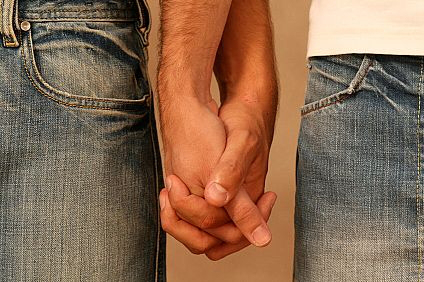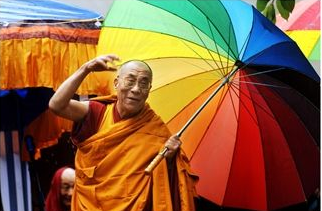Homosexuality & Buddhism
25 Sep
I have been reading up on Buddhist view of homosexuality. Although the view on homosexuality was not clearly defined by the Buddha but was later defined by Indian masters as ‘sexual misconduct’ – one of the ‘karmic sins’ of the body. However, contemporary Buddhist masters like the Dalai Lama and others are prone towards the idea that this traditional definition is colored by social norms of that era and leaves it open for re-interpretation. Whatever is the case, it is certainly interesting to see how Buddhist masters in the Buddhist spirit of openness, are willing to re-examine traditionally held views on human sexuality. Nevertheless, all forms of sexuality is ultimately renounced within the Buddhist monastic order in all Buddhist traditions.
Here are just some excerpts on homosexuality that I have encountered on Wikipedia that gives a rather broad perspective on this issue:-
—-
Among Buddhists there is a wide diversity of opinion about homosexuality. Buddhism teaches that sensual enjoyment and desire in general, and sexual pleasure in particular, are hindrances to enlightenment, and inferior to the kinds of pleasure (see, e.g. pīti, a Pāli word often translated as “rapture”) that are integral to the practice of jhāna. Some Buddhist texts advise Buddhists to avoid contact with third-gendered individuals and consider same-sex relations as sexual misconduct.
Some Buddhist leaders, like the 14th Dalai Lama and Chan master Hsuan Hua, have explicitly spoken against the act of homosexuality, which is considered harmful to the individual. Though the Dalai Lama explained “sexual misconduct” from the point of view of classical Indian texts, and as they are usually explained in Indo-Tibetan Buddhism e.g. by Tsongkhapa, the Dalai Lama expressed also “the possibility of understanding these precepts in the context of time, culture and society … If homosexuality is part of accepted norms [today], it is possible that it may be acceptable … However, no single person or teacher can redefine precepts. I do not have the authority to redefine these precepts since no one can make a unilateral decision or issue a decree … Such a redefinition can only come out of sangha discussions within the various Buddhist traditions. It is not unprecedented in the history of Buddhism to redefine [moral] issues, but it has to be done on the collective level.”; and the Dalai Lama called for further research and dialogue on this topic, “and concluded by reiterating the fact that, however the notion of sexual misconduct comes to be defined, it can never be used to justify discrimination against sexual minorities.” However, when interviewed by Canadian TV news anchor Evan Solomon on CBC News: Sunday about whether or not homosexuality is acceptable in Buddhism, the Dalai Lama responded that “it is sexual misconduct”. This was an echo of an earlier response in a 2004 Vancouver Sun interview when asked about homosexuality in Buddhism, where the Dalai Lama replied “for a Buddhist, the same sex, that is sexual misconduct”
The late Lama Thubten Yeshe, a Gelugpa Lama and founder of the Foundation for the Preservation of the Mahayana Tradition indicated that he did not consider homosexuality to be sexual misconduct. He states, “My own view, man stay with man, female stay with female, I don’t consider it good or bad. This is my opinion. It’s just no big deal, no big deal, that’s all.”
“People often ask me what I think about homosexuality. They wonder, is it right, is it wrong? The answer is, it is neither right nor wrong. It is just something that people do. If people are not harming each other, their private lives are their own business; we should be tolerant of them and not reject them.
However, it will still take some time for the world to fully accept homosexuality. All of us must learn to tolerate the behavior of others. Just as we hope to expand our minds to include all of the universe, so we should also seek to expand our minds to include all of the many forms of human behavior.
Tolerance is a form of generosity and it is a form of wisdom. There is nothing anywhere in the Dharma that should ever lead anyone to become intolerant. Our goal as Buddhists is to learn to accept all kinds of people and to help all kinds of people discover the wisdom of the teachings of Shakyamuni Buddha.” – Hsing Yun, Buddhism Pure and Simple, pp. 137–138
“Sexual misconduct” is a broad term, subject to interpretation according to followers’ social norms. Early Buddhism appears to have been silent regarding homosexual relations. However, Buddhists of Asian background, who form the majority of Buddhists in the world, consider homosexuality and transgenderism as part of sexual misconduct and usually disapprove of it.
The situation is different for monastics. For them, the Vinaya (code of monastic discipline) bans all sexual activity, but does so in purely physiological terms, making no moral distinctions among the many possible forms of intercourse.
Some Buddhist orders may specifically prohibit transgender, homosexually active, or homosexually oriented people from ordination but accept homosexuality among laypersons.
Regarding transsexual people, the earliest texts mention the possibility of a person supernaturally changing sexes; such a person is not barred from ordination, and if already ordained, simply changes orders.







It is just as easy to contemplate the impurity of the same sex as the opposite one, and I think that the contemplation of impurity in any sense while effective in the short term will not endure in the long term. The point is that if we settle for sense pleasure that is what we will get. And, if you work hard at your meditation and do not allow distraction, a pleasure will arise without the support of sense gratification. Find it; it’s there.